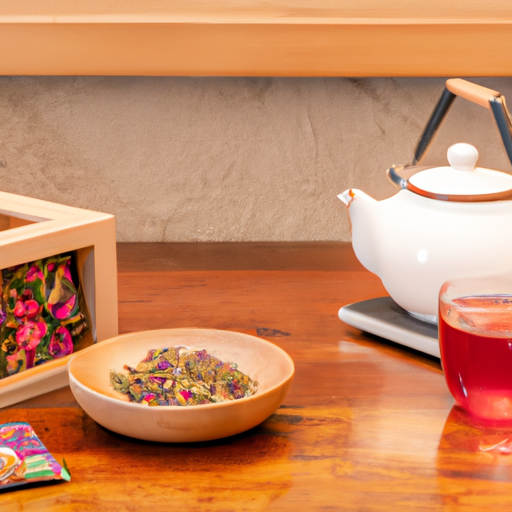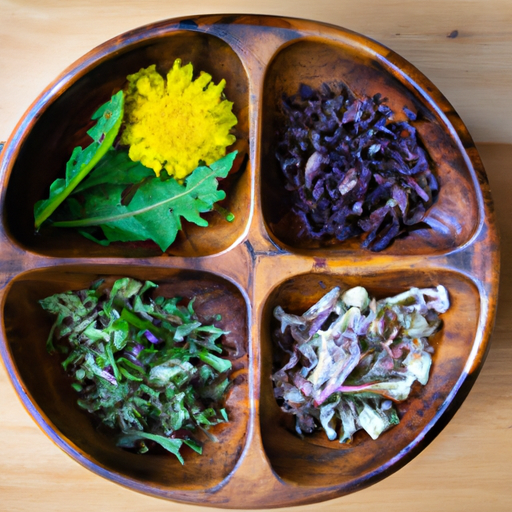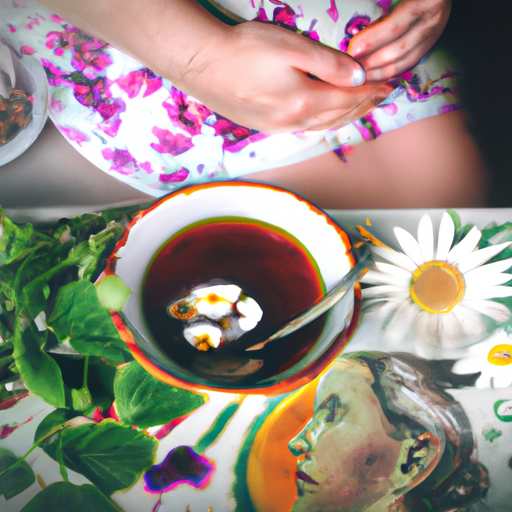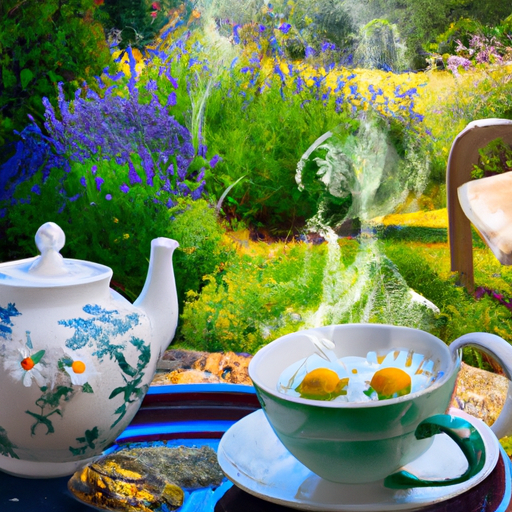Are you in the mood for a revitalizing and tasty beverage that will excite your taste buds? Then homemade blueberry herbal tea is the answer! With just a few easy steps, you can whip up a delightful blend that is not only scrumptious but also loaded with antioxidants and natural benefits.
As an avid tea enthusiast, I have perfected the art of making blueberry herbal tea, and I am excited to share my knowledge with you. By following my easy-to-follow instructions, you will be able to brew a steaming cup of this delightful tea in no time. From gathering the freshest blueberries to steeping them in hot water, every step is crucial in creating a truly satisfying beverage.
So, put on your apron and grab your teapot, because we are about to embark on a tea-making adventure!
Key Takeaways
- Blueberries add flavor and antioxidants to the tea, providing numerous health benefits.
- Boiling the water is crucial to release the flavors and properties of the blueberries and ensure a clean and pure tea.
- Infusing blueberries into the tea enhances its flavor and health benefits.
- Sweeten the tea to taste with honey, sugar, stevia, or agave syrup, while keeping in mind the health benefits of each option.
Gather Your Ingredients
Now, it’s time to gather all of the ingredients you’ll need to make this delicious blueberry herbal tea! There are different ways to use blueberries in herbal tea, and they add a burst of flavor and antioxidants to your drink. Blueberries are known for their numerous health benefits, such as boosting brain function, improving digestion, and promoting heart health. By incorporating blueberries into your tea, you can take advantage of these benefits while enjoying a refreshing and tasty beverage.
To make blueberry herbal tea, you will need the following ingredients: fresh or frozen blueberries, water, honey or sweetener of your choice, and tea bags or loose tea leaves. Make sure to choose ripe and plump blueberries for the best flavor. If fresh blueberries are not available, frozen ones work just as well.
Now that you’ve gathered all the ingredients, it’s time to prepare the blueberries.
Prepare the Blueberries
First, grab a handful of those juicy little blue gems and give them a good rinse. Blueberries aren’t just delicious, but they also offer numerous health benefits when incorporated into herbal tea. These little powerhouses are packed with antioxidants that help fight free radicals and promote overall well-being. Blueberry tea benefits include improving digestion, boosting the immune system, and aiding in weight management.
There are different ways to use blueberries in herbal tea. One method is to simply add fresh or frozen blueberries to your hot water and let them steep for about 10 minutes. This allows the natural flavors and nutrients to infuse into the tea. Another option is to crush the blueberries slightly before adding them to the water, which enhances the flavor and color of the tea.
Once you’ve prepared the blueberries, it’s time to move on to the next step: boiling the water. This is a crucial step in making blueberry herbal tea as it helps release the flavors and properties of the blueberries. Boiling the water also ensures that any impurities are eliminated, resulting in a clean and pure tea.
Now that the blueberries are ready, let’s move on to boiling the water and creating a delicious cup of blueberry herbal tea.
Boil the Water
To create a truly comforting and invigorating experience, all you need is some boiling water. Boiling water is the essential first step in making blueberry herbal tea. Not only does it help extract the flavors and nutrients from the blueberries, but it also serves as the base for this delightful beverage.
But why settle for plain boiled water when there are ways to enhance its flavor? Adding a hint of lemon zest or a sprig of fresh mint can give your water a refreshing twist. You can also experiment with different types of herbal tea instead of blueberry. Chamomile tea provides a calming effect, while peppermint tea offers a refreshing and uplifting taste.
To keep you engaged, here’s a table showcasing some alternative herbal teas to try:
| Herbal Tea | Flavor Profile |
|---|---|
| Lavender | Floral and soothing |
| Ginger | Spicy and warming |
| Raspberry Leaf | Earthy and fruity |
| Hibiscus | Tangy and tart |
| Lemon Balm | Citrusy and calming |
Now that you have boiled water ready, it’s time to steep the blueberries and unlock their rich flavors.
Steep the Blueberries
Once the boiling water’s ready, it’s time to infuse the blueberries and unlock their delightful flavors. Infusing blueberries into herbal tea not only adds a burst of fruity taste but also enhances the health benefits of the tea.
Blueberries are known for their high antioxidant content, which helps in boosting the immune system and protecting against oxidative stress. By infusing blueberries into the tea, we can harness these benefits and enjoy a delicious and nutritious beverage.
To infuse the blueberries, simply add a handful of fresh or frozen blueberries to the boiling water. You can also experiment by infusing other fruits like strawberries or raspberries for a unique twist.
Let the blueberries steep in the hot water for about 5-7 minutes, allowing the flavors to meld together and create a rich, flavorful infusion. During this time, the blueberries release their natural sweetness and vibrant colors, transforming the plain tea into a delightful treat for the senses.
Once the blueberries have steeped, strain the tea to remove any solids and transfer the liquid into a teapot or serving pitcher. This step ensures a smooth and clear tea without any unwanted particles.
Now that the tea’s ready, we can move on to the next step of enjoying a soothing cup of homemade blueberry herbal tea.
Strain the Tea
Now that you’ve let the blueberries infuse their flavorful goodness into the hot water, it’s time to strain the tea and prepare for a truly refreshing experience.
Straining the tea is an essential step in ensuring a smooth and enjoyable cup of blueberry herbal tea. There are different ways to strain herbal tea, but the key is to choose the right type of strainer that suits your preferences.
One popular method is to use a fine-mesh strainer. This type of strainer effectively removes any loose blueberries or tea leaves, leaving you with a clear and pure liquid. Simply place the strainer over your cup or teapot and pour the tea through it. The fine-mesh will catch any solids, ensuring a smooth texture.
Alternatively, you can use a tea infuser or a tea ball. These handy tools are designed specifically for steeping tea and straining out the solids. Fill the infuser or tea ball with the blueberry tea and place it in your cup or teapot. As the tea steeps, the liquid will infuse with the blueberry flavor, and when you remove the infuser or tea ball, you’ll be left with a perfectly strained cup of tea.
Now that the tea is strained, it’s time to sweeten to taste and enhance the flavors even further. Adding a touch of honey or a sprinkle of sugar can complement the natural sweetness of the blueberries. But we’ll explore more about sweetening in the next section, where you’ll learn how to perfectly sweeten your blueberry herbal tea without overpowering its delicate flavors.
Sweeten to Taste
Enhancing the flavors of your blueberry-infused tea is as simple as adding a touch of sweetness, like a melody of honey or a sprinkle of sugar. Not only does this step elevate the taste of your tea, but it also provides an opportunity to explore the health benefits of herbal tea and choose the perfect sweetener for your preference.
Herbal teas are known for their numerous health benefits, such as boosting the immune system, reducing inflammation, and promoting relaxation. Adding a natural sweetener like honey can further enhance these benefits. Honey isn’t only a healthier alternative to refined sugar, but it also contains antioxidants and antimicrobial properties, making it a great addition to your blueberry herbal tea.
If you prefer a less intense sweetness, you can opt for a sprinkle of sugar. While refined sugar should be used in moderation, it can still provide a delightful taste to your tea. Additionally, there are other natural sweeteners like stevia or agave syrup that you can experiment with to find the perfect balance for your taste buds.
Now that your blueberry herbal tea is sweetened to perfection, it’s time to savor the fruits of your labor. Enjoy your homemade blueberry herbal tea and let its soothing flavors transport you to a place of tranquility and relaxation.
Enjoy Your Homemade Blueberry Herbal Tea
Indulge in the comforting embrace of your very own creation, and let the soothing essence of your homemade blueberry-infused tea transport you to a state of pure tranquility. Blueberry herbal tea not only delights your taste buds, but it also offers numerous health benefits.
Here are some creative ways to use blueberry herbal tea in recipes:
-
Infused Desserts: Use blueberry herbal tea as a base for homemade ice cream or sorbet. The fruity notes will add a refreshing twist to your favorite frozen treats.
-
Mocktails and Cocktails: Mix blueberry herbal tea with sparkling water, lemonade, or even a splash of vodka for a delightful and refreshing drink. Garnish with fresh blueberries for an extra burst of flavor.
-
Salad Dressing: Create a unique vinaigrette by combining blueberry herbal tea with olive oil, honey, Dijon mustard, and a touch of lemon juice. Drizzle over a bed of fresh greens for a burst of tangy sweetness.
-
Smoothies: Amp up the flavor and nutritional value of your morning smoothie by adding blueberry herbal tea as the liquid base. Blend it with your favorite fruits, yogurt, and a handful of spinach for a nutritious and delicious start to your day.
Exploring the health benefits of blueberry herbal tea and incorporating it into your recipes opens up a world of possibilities. So, sit back, relax, and enjoy the tranquility that comes with savoring your homemade blueberry herbal tea.
Frequently Asked Questions
Are there any alternative ingredients that can be used instead of blueberries?
When it comes to alternative fruits for blueberry herbal tea, there are a few options to consider. However, it’s important to note that using dried blueberries has numerous benefits, such as added antioxidants and a rich, fruity flavor.
Can I use frozen blueberries instead of fresh ones?
Yes, you can use frozen blueberries in blueberry herbal tea. Using frozen blueberries offers the benefit of a longer shelf life and easier availability. They still retain their flavor and nutrients, making them a convenient option for tea-making.
How long should I boil the water for?
To make the perfect blueberry herbal tea, I recommend boiling the water for about 5 minutes. This ensures the water reaches the ideal temperature to extract the flavor and benefits from the blueberries.
Can I add other herbs or spices to enhance the flavor of the blueberry tea?
To enhance the flavor of blueberry tea, I recommend experimenting with herbs like mint or lavender. Spices like cinnamon or ginger can also add a delightful twist. Don’t be afraid to get creative and find your perfect blend!
How long should I steep the blueberries for to get a strong flavor?
To infuse a strong blueberry flavor into your tea, steep the blueberries for at least 10 minutes. This allows the natural oils and flavors to fully infuse into the hot water, creating a rich and vibrant taste.
Conclusion
After following these simple steps, I’ve successfully made a delicious cup of homemade blueberry herbal tea. The aroma of the freshly brewed blueberries fills the room, transporting me to a serene blueberry field.
As I take the first sip, the vibrant flavors burst on my tongue, leaving a refreshing and soothing sensation. The smoothness of the tea pairs perfectly with the hint of sweetness from the added natural sweetener.
Nothing beats the satisfaction of indulging in a warm cup of this delightful blueberry herbal tea, made with love and care.










